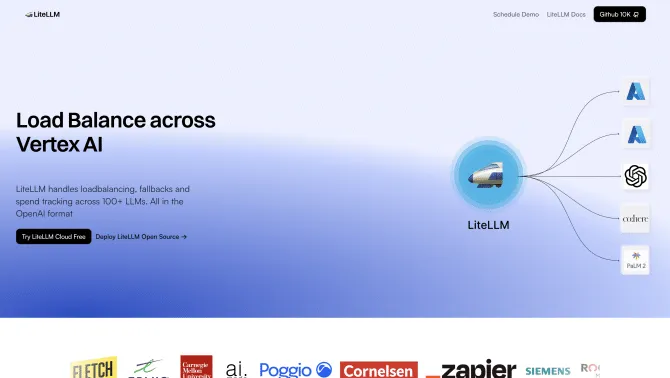Introduction
LiteLLM is an innovative open-source library designed to simplify the process of integrating and managing interactions with a multitude of Large Language Models (LLMs). It provides a unified interface that abstracts away the complexities of individual provider APIs, allowing developers to interact with over 100 different LLM models using a consistent and familiar OpenAI-like API. This not only accelerates development but also enhances the maintainability of applications relying on LLMs.
background
Developed by the community-driven BerriAI, LiteLLM has emerged in response to the need for a standardized approach to LLM API integration. With the rapid growth of AI capabilities and the increasing number of providers offering specialized LLMs, developers face the challenge of managing diverse APIs and maintaining compatibility. LiteLLM addresses this by offering a single point of interaction that can dynamically adapt to various models and providers.
Features of LiteLLM
Unified API Interface
A consistent interface that mimics the OpenAI API, simplifying the integration of multiple LLMs.
Input Translation
Seamlessly translates user inputs to match the specific endpoint requirements of various LLM providers.
Consistent Output
Ensures that text responses are uniformly structured for easy parsing and handling.
Retry/Fallback Logic
Intelligently manages retries and fallbacks to alternative models in case of errors or failures.
Cost Management
Enables tracking of expenditures and setting budgets to control costs across different projects and models.
Observability
Supports logging and monitoring through predefined callbacks to various platforms for improved observability.
How to use LiteLLM?
To begin using LiteLLM, developers should first set up the environment with the required API keys and then utilize the Python SDK to interact with the desired LLM models. Detailed documentation and examples are available on the official website and GitHub repository to guide users through the process.
FAQ about LiteLLM
- How do I get started with LiteLLM?
- Install the LiteLLM package via pip, set your environment variables with your API keys, and begin calling the completion functions as demonstrated in the documentation.
- What models are supported by LiteLLM?
- LiteLLM supports over 100 different models from various providers, including but not limited to OpenAI, Azure, HuggingFace, and more.
- How can I handle exceptions with LiteLLM?
- LiteLLM maps exceptions across all supported providers to the OpenAI exceptions, allowing for consistent error handling.
- Is there a proxy server I can use with LiteLLM?
- Yes, the LiteLLM proxy server can be used for additional features like cost tracking, load balancing, and rate limiting.
- Can I contribute to LiteLLM?
- LiteLLM is open-source, and contributions are welcome. Check the GitHub repository for guidelines and issues to work on.
Usage Scenarios of LiteLLM
Academic Research
Researchers can utilize LiteLLM for natural language processing tasks, such as text generation and summarization.
Market Analysis
Analysts can use LiteLLM to process and analyze large volumes of textual data to identify trends and insights.
Customer Support
Companies can implement LiteLLM in chatbots to enhance customer interactions with natural language understanding.
Content Creation
Content creators can leverage LiteLLM to generate ideas, write articles, or create engaging social media posts.
User Feedback
LiteLLM has been a game-changer for our development process, allowing us to quickly switch between different LLMs without altering our codebase.
The consistent output format provided by LiteLLM has saved our team countless hours that would have been spent on data parsing and error handling.
LiteLLM's proxy server has been instrumental in managing our API calls, especially for tracking costs and ensuring we stay within budget.
The documentation and community support for LiteLLM are excellent. It's clear that the developers are committed to making this tool as accessible as possible.
others
LiteLLM's open-source nature means it's constantly evolving to meet the needs of its user base. With active development and a growing community, it's a robust choice for any project requiring LLM integration.
Useful Links
Below are the product-related links of LiteLLM, I hope they are helpful to you.
